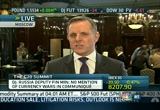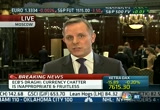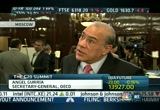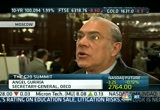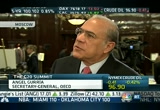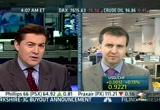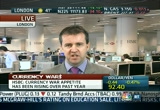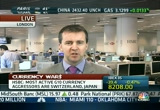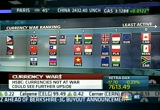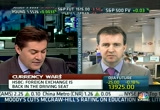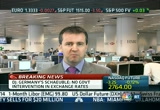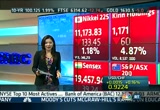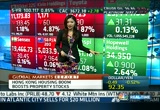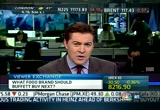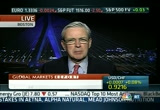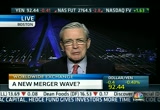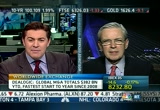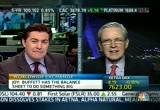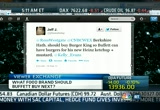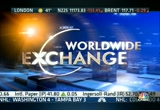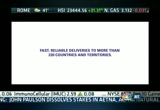tv Worldwide Exchange CNBC February 15, 2013 4:00am-6:00am EST
4:01 am
4:02 am
the g-20 looks to avoid harsh rhetoric. i don't think we should be losing any time in talking about the currency wars. there's no currency wars. with we are furthest away today from a currency war than we were two or three years ago. >> the end firms also underpinned by expectation tess japanese prime minister is close to selecting his nominee for the governor of the bank of japan. and get out your binoculars. it's time to go what he will watching. plus, shares in commerce bank at the bottom of the dax, the bank warnings it will have to make more provisions on toxic loans. okay. warm welcome to you.
4:03 am
i'm flying solo today. you might have seen kelly was on "squawk box." g-20 finance ministers of the central bank is kick off officially those weekend squawk in russia. they're expected to deliver a pledge of monetary policy while focusing on measures to boost global growth. steve has been there all week and he joins us again this morning. steve, we actually finally start the meetings today. we've had comments out from the russian finance minister, as well. what's he saying? >> well, he's trying to get us back on track on to a growth agenda, which when you look back at what the agenda was a couple of meetings ago back in toronto in 2010, that was sorely missing. that was about harboring deficits and having firm targets. it hasn't really worked, has it? what they've said is our growth estimates were slightly optimistic. listening to what some of the policymakers are saying this time around, the likes of mario
4:04 am
draghi, i'm scratching my head a little bit. there's some uncontentious stuff. i can live with that. range of financial market indicators showing situation normalizing. but what about this bit? currency chatter is inappropriate, fruitless and self-defeating. hang on a second, mr. draghi. it wasn't us, the journalists that started this. it was policymakers. it was the g- 7. it's incestble we're going to start rumbling about this. i can't help but thinking mr. draghi is missing the point here. if they start this debate, we're going to carry it on. there's a lot of contention as to how we go forward. anyway, i spoke to the russian minister yesterday. jobs, economic stability, financial market regulation,
4:05 am
regulation of the energy market. he wants a focus on longer term growth goals and that's what the oecd is looking at, as well. they're going to release a 292-page document looking at company specific reforms and structural issues that need to be looked at going forward. >> i don't think we should be losing any time in talking about the currency wars. we are furthest away today from a currency war than we were two or three years ago. today, our -- in the oecd, our research shows that we're pretty close to balance with most of the -- with the biggest currency, the most important currencies. so we don't see why we should be talking about currency wars. this currency war is no longer operational. we're using jargon from the past. we're fighting an old war.
4:06 am
today, we should be concentrating on productivity. we should be cobs traiting on competitiveness and we are being distracted by this currency discussion. >> we're not talking about decades. the 2010 are talking about brazilian wars. >> it was three years ago already. it's decades. it's centuries ago. we're in the middle of this crisis. >> and three years ago was toronto 2010 and the communique then had the wrong focus at the g-20. it was focused on deficit reduction. >> it did not have the wrong focus. what it was was overestimated growth. >> they got it wrong. >> no. what we -- we were optimistic about growth. but now we should not give up on the deficit reduction. we should not give up on the fiscal consolidation. but we should string it out over a longer period of time so that we give a chance to the automatic stabilizers to come in because we have less revenue because there is less growth. we should adjust the program
4:07 am
so -- >> you're not talking about -- it sounds to me, and correct me if i am wrong, it sounds to me like you're talking about kicking the deficit reduction target into the long grass, you're talking about 2016 as the potential era where we can have a meaningful cut in deficit. if 2010 was a long while ago, 2016 is long into the future. >> that is indeed what i'm saying. pushing forward the time when you are going to arrive at these targets for this reason. if you have less revenue, it is because you have less growth. if you want to compensate the less revenue by cutting the expense, then you have even less growth. you're going to be chasing your tail all the time into a downward spiral. to avoid that, you say, okay, i keep my deficit reduction target, but i string them out longer so you would not have such a painful adjustment. >> i thought it was very interesting his interpretation
4:08 am
versus mine. i said they got it wrong. he said they got their growth estimates slightly optimistic. i said you're kicking it into the long grass, he said we're adjusting that. i think we're talking slightly in different ways the.one thing i would say is one company and perhaps the most systemically important is the united states. we're going to speak to the top u.s. official at this meeting. ross, back to you. >> steve, good stuff. plenty more to come. let's get more from darah from hsbc. darah, are countries involved in currency wars or is it just the result of central bank policy which they need for their own domestic economy?
4:09 am
well, i think actually both, really. but our assessment is that there is evidence of this currency war. the number of players is rising, the number of tools they're using to deliver it is grog. and just the scale of players. you have the japanese yen in the currency in maneuvering position and it's far more significant. there are far bigger players in the fx market than what we've seen in the past. >> you've done this chart. the most active is switzerland and japan. now, swisserland because they have a peg which they're defending. in japan, one could easily argue that their currency was far too overvalued. >> yeah. >> and oversold of their own. >> they don't dispute that. i'm sure it's a starting point when japan began this promise of radical monetary easing. and talking down its currency because they talked about it being overvalued and needing
4:10 am
this adjustment. we had said at the starting point the was an overvalued one. but where they have now moved to is borderline undervalued. the toughest g-20 conference, we can only identify with currencies that are more undervalued. so justify, yesterday, perhaps in starting this process, but can they sustain it? we would argue not. that's why, if you like, they're at the top of the scale in terms of appetite, but their starting point is perhaps a more justifiable one. >> that is given some reaction today. bear in mind we appreciate since november the dollar against the yen. what actually is -- how much more is there in terms of the moves cross rate? >> honestly, i don't think very much. our year-end target on dollar/yen is 80. at the moment, it's looking
4:11 am
rather distant. we don't think the bank of japan is going to deliver the radical easing and seismic shift. the market will perceive him as the least dovish of the three. nonetheless, a bit of a disappointment there. it doesn't feel like there's much juice in there. it's difficult to say there's not a currency war, but it's a bit like a child putting their hands over their eyes and saying, look, i've disappeared. they're under pressure not to do much more. >> interesting. we take a look at the rest of your least active chart here in the currency wars. canadian dollar is next and the euro, as well. draghi has obviously been speaking this morning saying currency chatter is inappropriate. inflation is not a policy target. it's important for growth. but if they wanted to do anything to weaken the euro,
4:12 am
what policy actions could they actually take? >> well, i mean, on paper, they have not options. they can cut interest rates and they could, of course, embark on quantity tative easing, not omt, but buying bonds across europe. but to strike us at likely prospects at this point when talking about the recovery moving to a more stabilization stage. the euro would strike us as an obvious safety buzz. it would rise to currency weakness elsewhere. i think that will be a problem for europe and it's one that they're trying to mitigate now and one they're trying to talk down now it seems from draghi's comments. >> and the german finance minister saying exchange rates should be market oriented. so it looks like the euro will remain least active. i also want to pick up on comments we had from the rba board member edwards overnight
4:13 am
saying the aussie/dollar was extremely high. is that a hint that, you know, they will -- they won't have a cut in interest rates to weaken the dollar, but is that an indication? it's a bit like the bank of england saying we don't mind if the currency weaknesses. we're not going to be worried about the impact of that. >> this is what ivengd peculiar. some like to argue weaker currencies are a side effect of monetary policy. if you're acknowledging that in the way that this is the transmission mechanism, then i'm sorry, you are using exchange rate and australia could be -- i won't say accused of that, but i'm sure they don't mind a weaker aussie. the uk i think would be equally comfortable with the weaker sterling and overnight saying they might cut rates. i think it is a global theme. i'm sorry to disagree with them and multi nationals heads out there omcdf, i think we are in the midst of a currency war.
4:14 am
>> clear enough. thank you for joining us first thing this morning. let's bring you up to speed with where we stand in the currency markets. weighted to the downside. around about 6 to 4 decliners outpacing advancers. pretty flat, truth to be, really. the ftse is down about five points. and we saw this yesterday. there was the push/pull from those much weaker growth rates for the eurozone but, of course, still fairly good corporate numbers coming up. take a look at the bond markets there. we got through the auctions this week fairly comfortably. 10-year gilt yields have come back. we hit 2.2% yesterday. we're back down to 2.15 mers.
4:15 am
on the currency markets, dollar/yen has strengthened begins both the euro and the dollar. not a huge reaction to the composite. sterling/dollar, just below 1.55 yesterday holding steady ahead of the retail sales numbers, as well. brent towards nigh neck, not far away, just coming back 1.70. and we'll talk about gold on the spot price. that's why we stand with these asset prices right now in european trade. let's recap the day/week whatever you like in asia. sixuan is with us. >> it's lackluster day of trade in asia. focus remains on moscow with all eyes on the g-20 meeting. the nikkei eased 1.2% today while the yen strengthens as
4:16 am
japan continues to grab the headlines. investors are fretting over g-20 currency. kiri this holdings slipped after cutting its full year operating forecast and toyota shares lost nearly 2% after they reached a settlement in the u.s. over the safety recalls back in 2009. other currency sensitive automakers sun as honda and suzuki shares draft. volumes remain close as some markets are still closed for the lunar holiday. bearing in mind the stock has surged 7% since may. elsewhere, south korea's kospi
4:17 am
managed to hold around a three-week high ending higher by a such. meanwhile, australian shares eased a touch at its 4 1/2 year high. mining giants reported its first annual loss after the closing bell. india's sensex is trading lower by a modest 0.12%. >> thanks for that, sixuan. warren buffett berkshire hathaway and 3g castle teamed up to buy heinz for $23 billion in cash. that's a 19% premium to the stock's all-time high, including debt. the buffett/heinz deal is the largest ever acquisition in the food industry. now, mr. buffett counts dairy queen among his food holdings. what iconic food brands should mr. buffett be joining next?
4:18 am
send me an e-mail, tweet me. what else should mr. buffett put on his buffet? so is it war and peace for currencies at g-20 meeting? still to come, we'll speak to lael brainard. we've got retail sales out today in the uk. the manager director of giesen hawks will join me to size me up at 9:40 cet. >> geeld touches a six-week low in asian trade. we'll discuss the opportunity for the precious metals market at 9:to. plenty more to come on "worldwide exchange." to grow, we have to boost our social media visibility. more "likes." more tweets. so, beginning today, my son brock and his whole team will be our new senior social media strategists.
4:19 am
any questions? since we make radiator valves wouldn't it be better if we just let fedex help us to expand to new markets? hmm gotta admit that's better than a few "likes." i don't have the door code. who's that? he won a contest online to be ceo for the day. how am i supposed to run a business here without an office?! [ male announcer ] fast, reliable deliveries worldwide. fedex. where will it send me... one call to hoveround and you'll be singing too! pick up the phone and call hoveround, the premier power chair. hoveround makes it easier than any other power chair. hoveround is more maneuverable to get you through the tightest doors and hallways. more reliable. hoveround employees build your chair, deliver your chair, and will service your chair for as long as you own your chair. most importantly, 9 out of 10 people got their hoveround for little or no cost. call now for your free dvd and information kit. you don't really have to give up living, because you don't have your legs. hoveround replaced the legs. and now every hoveround comes with this handy tote bag and cup holder for access to your favorite items.
4:20 am
4:21 am
4:22 am
the price berkshire and 3g are paying for the foodmaker. warren buffett has been pretty busy. berkshire's menu of companies, an s.e.c. filing shows he bought news stakes in adm and as well as holds in u.p.s. gm directv, amex and verisign. what's happening to that portfolio today, general motors and directv are the fallers and archer daniels and verisign are the gainers. george soros is out of tech and loaded hi position in the spider gold trust. paulson also saw his stakes, though, in etna and alpha natural.
4:23 am
he's signaling he's really to start help put the company in play. the move puts him in direct competition with blackman. the two famously fought on cnbc last month when icahn called ackman a major lose r. korean airlines says it may bid for a 44% stake in czech airlines. a spoke person said it's conducting due diligence, but hasn't decided whether to do the deal alone or deal with a consortium. they're looking to sell the struggling airline over the next few months, probably in april or may. still to come on the program, while the u.s. has seen anl n&a frenzy, what does it deal look like? analysis from hong kong in
4:24 am
around 15 minutes time. angelo american swung to a net loss of $1.5 billion for 2012. that's compared to a net profit of 6 billion in the previous year, but underlying earnings beat forecasts as production rose across all key divisions except platinum and diamonds. the outgoing ceo cynthia carol said she was optimistic about the company's future. >> it's a transition. and i think we've got a great future and i think the outlook for the fundamentals of this industry is very strong. >> commerzbank says it will be forced to increase provisions on toxic loans this year and it's warned that it's unlikely to pay a dividend. earlier in the month, they reported a full year profit of 6 million euros. >> shares in french luxury group
4:25 am
ppr show the highs in paris. stephane has got more on the details for us out of paris. hi, stephane. hey, ross. for the first time since last year, dp posted its results without snag which is cultural goods in electronic retailers and that's really a sign that the transformation of the company from a retail group to a luxury group and that was a good choice because luxury was really what drove profits higher last year, up 6. % in line with expectations. the luxury division which includes gucci at a 15% growth last year. the brands were the most dynamic ones with nearly a 0% growth and gucci remained the most profitable one with an operating income of 1.1 billion euros. that's nearly a 20% increase in 2012. the sport and life signs division which has a central
4:26 am
grand puma was a bit weak last year, 3.3% increase. but the ceo of the company remains confident that the sport and lifestyle unit will be able to post in the future as the luxury brand. pbr is confident that it will increase again sales and profits in 2013. there is no precise guidance. the company will propose a guidance of 3 euro 75 per share. that's an increase from 2011. reaction is very positive in paris. share price is up 5%. >> and, stephane, we understand, you know, that airbus now is not going to have lithium batteries in the a-350. what are the implications for that? does that mean there will be a delay in that program or not? >> it's to avoid delays, actually. sometimes the new technology is
4:27 am
not sure enough or is not -- is too much to be a safe bet and it's exactly the choice that airbus has made after the problems with the batteries of the dreamliner. it will use the traditional batteries instead of the new technology, the lithium batteries. the choy was made to the prevent further delays in the release of the airbus 350. airbus would like, for instance, to ignore dramatic consequences in case regulations would change for the use of lithium batteries in aircraft in the future. >> yeah, okay. we'll see what happens. thanks for that, stephane. catch you a little later. he has the full story on our website, go to cnbc.com for more on that. still to come, we'll take another check on luxury retail
4:28 am
4:31 am
these are your headlines from around the world. the g-20 looks to avoid currency rhetoric. >> there's no currency wars. we are furthest away today from a currency war than we were two or three years ago. the firms underpinned by expectation webs the japanese prime minister is close to selecting his nominee as governor of the bank of japan. get out your binoculars. it's time to go whale watching. talking of selling, shares of commerzbank, the german bank warnings it will have to make more provisions on top pick loans. january retail sales out of
4:32 am
the uk including fuel down minus 0.6% on the month. the poll was for an increase of 0.4 and an annual increase of 0.8. it was a disappointing number since april last year. the fall in food sales was the main driver of lower overall sales. and the snow hurts growth in particular. january retail sales, excludeing fuel, were down 0.5%. so food sales is the main driver. we had a lot of bad weather, as well, in the uk. so i think you could probably -- you might see a bounce back in february. if it was weather effective. snow hurting small growth in particular. so it could just be a weather-related issue rather than any sense of some fundamental or different underlying weakness than we thought. nevertheless, sterling is taking hit on that now below 1.5 5 against the dollar. so i think we're going to have
4:33 am
to see ow this -- as with anything, monetary retail sales can be rather volatile particularly with the weather impact. we'll have to see how this rolls out. but we'll see. so keep your eye owes that. sterling weakening. we'll see what happens with gilt yields, as well. still to come, we're taking a look at the demand stories with ray clasher. right now, european markets, weaker. your ftse 100 just down on the session low. the xetra dax off 0.3%. the ibex off 0.5%. the cac 40 is fairly flat right now. yields in spain, 5.2%. they're slightly higher on the session. bund yields are slightly lower. gilt yoolts yields coming out. retail sales is helping gilt
4:34 am
yields. on the currency market, euro/dollar is not far away from where were we? about a three-week low against the euro/dollar. dollar/yen, 92.36. and we've got the mexico central bank govern warning against using fx. mexico was one of those countries that are the lead active in the currency manipulation or currency war. he says devaluing fx raises the risk of global retaliation. it's one of the big themes at the g-20 in moscow. steve is there, as well. steve, we've been hearing from mario draghi on this subject this morning, as well. what did you have to say? >> well, i thought this was great. the press conference of morrow draghi, the president of the ecb saying it's inappropriate, it's fruitless and self-defeating to talk about currency wars. i can't help but get all billy joel over this. it was the policymakers who started talking about
4:35 am
communiques and briefings against each other about what they were actually trying to say. i'm afraid to say, mr. draghi, we didn't start this buyer. it was your colleague and your peers in the central bank, as well. moving on, he was saying -- and i thought this was great. some asked him about the appropriate level for the euro which is exactly the problem that the japanese got into trouble and he said he didn't have a specific number but said it was in line with the averages. he refused to talk about the communique, as well. it's how strongly worded that communique is about competitive valuitions that everyone is getting excited about. but nobody wants to name the villains of this piece. they think it's very important to remain coordinated. yet if they all had competitive coordination of those economies, it would have the national ramifications. as daragh maher pointed out to you earlier on, he believes there is a currency war in
4:36 am
action. so the market interpretation compared to the policymakers appears very different. ipos is a key topic for russia at the moment. to get the state influence lessened somewhat, and ipos is a key contention. of course, in the london market, around about 18% of the london market cap is made up of russian companies because they're not sure about the quality of the investor base in russia to, obviously, have those listings. now, i spoke earlier to yevgenni , the head of the moscow inter bank exchange. it had its ipo just over an hour ago. it's trading just above the issue price of 55 rubles. and i spoke to the ceo about some of these key issues and about getting international investors excited about investing in an ipo here in
4:37 am
russia or hong kong. let's listen in. >> the importance is for our business going forward because we come and speak with our clients and say, listen, you can do a sizable ipo on the exchange. we want to go out there and demonstrate it ourselves that we can go and raise half a billion dollars. it's a good saturday start. >> what has the international community been like? >> it has been predominantly good in judicial names. >> when i look at russian companies, i know that now roughly around about 18% of the listing market cap on the london market, for instance. why is it that all these kwps are going to say, we will listen on the russian market instead of listing in long core or possibly new york? >> the difference is that our market would be -- london would be -- smart guys. and in russia, a lot of positive
4:38 am
changes taking place in order to bring more demand side, log pension funds, retail money trading here. it will be a different mix of investors base here. so that will make a difference. >> that was the cfo talking to me earlier. we saved the best for last on "worldwide exchange." we're going to be speaking to the top u.s. official for the g-20. lael brainard, we'll speak to her in the next hour of the program. back to you, ross. >> steve, we look forward to that, as well. this is a global story concerning oscar pistorius. he has -- this is the disabled athlete, he has been charged for the murder of reeva steenkamp, who was his girlfriend, charged with one count of murder. that was just a general news story that just came out.
4:39 am
let's turn our attention to m & is & a. korean airlines says it may bid for a 44% stake in czech airlines. a korean air spokesperson said it's doing due diligence. the czech government said it's looking to sell the struggling airline in the next few months, probably in april or may. there's divested a minority stake in the french firm a year ago. so compared to last year, m&a activity is aif to a slow start in 2013, but given the proliferation of easy money, that could soon change. for mow, we're joined by andrew lung. nice to see you. in the united states, of course, it's the opposite. we've got plenty more m&a than last year. what will drive it in asia?
4:40 am
>> well, i think there are basically four underlying trends. the first is the whole world is printing money, making the cost of funds much lower and the prospects of lower cost is still there. again, a possible and quite probable asset inflation. so the money, the huge liquidity is changing over and m&a is illegal to capture some of the surprise assets. so that's the first trend. the second trend, of course, is a dramatic turn of the direction of the japanese yen. and, of course, japan is right in the heart of asia. and so it pays to borrow japanese yen to acquire ssm and to boost up the share prices. so i think that is a major game changer. the third major trend is china, the china story is getting bigger and bigger and bigger. not only that, the money is
4:41 am
coming out of china rather than investing in u.s. treasury, it's chasing for the acquisitions of sf and equity stakes and various companies to earn higher returns and also gain larger market share. now, the fourth trend, of course, is the huge asian plus china kind of trade block. it's one of the largest in the world by population size. but it's also growing much faster compared with other markets. so all these four different trends trarns late for positive earning he in the region. >> where are the map opportunities, then, if you're looking from an investment angle? where would you see the sectors you get most of this transaction? >> right. right. so you would look at the region. what's happening is the rise of
4:42 am
the middle class. in china, of course, at the country is changing from an export dependent economy to an economy of more balance towards internal consumption, i.e., underpinned by the rising middle class. and the same story you were saying around the rest of the asian economies. so that translates into consumer goods and at the top end luxury brands. china is building 221 new cities from now to 2025. so there is a huge demand for the basic kind of commodities that is building roads, bridges, highways, motor base and so on and so forth. so i think there is a market for some of the dmodties there. and that, of course, is the asian profile in the region as
4:43 am
the company size, as the family size is dwindling. so that, again, translates to demand for health products, lifestyle products and so on. so i think there is a lot of the positive area to look forward to in the region. >> andrew, we've been talking a lot, of course, about currency today with the g-20, as well. will currency have a factor to play on m&a? i'm presuming if your country is strengthening or weakening, that changes the economics quite a lot. >> yeah, sure. as i was saying in the beginning, the whole world is printing money. so certain currencies are -- especially the japanese yen on a down turn. and then on the other hand, the renminbi, the chinese yen is gradually on the up trend. so you can play both ways.
4:44 am
and as far as the chinese yen is concerned, the higher purchasing power translates into a bigger purchasing power in terms of money coming out of china. so that has a role to play. then with m&a, you're looking at reducing costs, but also plucking the loophole in your company's profile. so i think that that translates into m&a, especially in this gloomy world economy. some companies facing a downturn and they need to look for partners. and to capture the kind of growth momentum that we see in this region. >> andrew, always good to see you. have a good weekend.
4:45 am
now, as you say, quiet on the m&a front. more for us in tokyo. hi, toshiko. >> hi, ross. japanese financial services company is set to buy dutch asset management firm roboco. the deal is worth about $2.7 billion dollars and an announcement could come as early as next week. this will be the biggest acquisition ever by orex whose businesses include investment banking, life insurance and a professional baseball team. bidding for the dutch asset management firm began last year. the dutch cooperative bank is expected to keep a minority stake of about 10%. for orix, this deal would open up possibilities for expansion in broad range of financial services in japan and abroad.
4:46 am
rabobank can strengthen its following the debt crisis. they sell off pieces of themselves. japanese firms are increasingly look into these dals as they seek to expand overseas since domestic markets remain stagnant. they plan to spend $3.2 billion on m&as in the next thee years. back to you, ross. >> toshiko, thanks for that. have a good evening and a good weekend. reminder of what's on the agenda in asia next year, trading after a week long lunar new year break. australia's earnings parade continues with bhp billiton and fortescue set to come out with their earnings on wednesday. still to come on today's
4:47 am
show, he's been responsible for 112 outlet necessary china. now the new managing director of traditional british tailoring wants to turn his attention to the u.s. we'll get into it when we come back. great, everybody made it. we all work remotely so this is a big deal, our first full team gathering! i wanted to call on a few people. ashley, ashley marshall... here. since we're often all on the move, ashley suggested we use fedex office to hold packages for us. great job. [ applause ] thank you. and on a protocol note, i'd like to talk to tim hill about his tendency to use all caps in emails. [ shouting ] oh i'm sorry guys. ah sometimes the caps lock gets stuck on my keyboard. hey do you wanna get a drink later? [ male announcer ] hold packages at any fedex office location.
4:50 am
airbus will drop the use of lithium batteries in its aircraft. european planemaker which says the decision is based on reducing uncertainfy in the delivery schedule has begun in forming airlines of the upcoming a-350 will instead use nickel kadium batteries. they're looking at having the first a-350 planes in service during the first half of 20134. carnival cruise lines says all the passenger are off the disabled shift that was towed into port end ago five-day deal. it was set adrift in mexico on sunday after an engine room fire damaged the propulsion system. toilets stopped working and there were food shortages.
4:51 am
some of the more 4,000 passengers and crew say they're glad to be back on land. carnival says they've apologized as passengers were disembark barking. uk retail sales were down in january according to the data release in the last half hour. the office of national statistics says bad weather was largely to blame for the 4.6% drop. it was food sales that were mostly affected. meanwhile, a uk luxury retails was shrugging off expansion. the iconic men's wear company which counts david beckham among its clients is seeing a boom around the world. joining us is ray klatter, the newly appointed manager at gievel and hawkes. you were responsible for the expansion into china. 112 stores in china.
4:52 am
>> as of the last we're, we opened our largest store in beijing which made it 112, yes. >> what's been the trick in being successful in china? >> i have to tip my hat to robert gieves. i think he was a bionear of getting in there. people assumed that the last five years has all been about china, but tale, if you look at our competitor witness they've all been in the market for 20 years spop we had a number of stores in the hopping congress region and in taiwan, but very little in the main.land. in 2006, what we had the opportunity to do is work with trinity liberty. we have a number of men's wear brands. they required, as you know, since then they got very serious about our brand. we met with the ceo, the chairman of trinity in 2006 and they gave us the impetus we needed to push on. we got in at the absolute -- you
4:53 am
know, we rode that dragon into the last five years, it's been a roll out, really. >> but while we've had that success in china is gieves lost a bit in its home market in the uk. london is doing okay. but some of the stores -- >> london was a big help, actually. that's going a lot to do with tourism, of course. but certainly it's fair to say that over the last five years, the band has not really invested in its domestic market. hence the acquisition of the brand last year. really, the licensee becoming the licensure. i'm tasked with coming back from hong kong building a uk management team and focusing on a domestic market first. i know everybody wants to talk about the u.s. but, really, it's about cleaning up london first. >> and that does not change it on the fashion side, does it? >> not a fashion brand. but i don't think we will be. i think it's more a man style.
4:54 am
i think the luxury retailing has had incredible growth over the last five years. >> why is that? >> it's all over london and the west end these days. i think the way men want to dress is more dress up and not dress down. >> the financial crisis had an impact on that. >> there's an old saying about when swimming with sharks wear protected clothing. i think people are dressing up to the point of making sure they look as good as the boss if not better. >> you mentioned the u.s. never really sort of been there. and it's always a potential graveyard. >> we've been there many times. this brand has a 240-year history. certainly in the last 50 years, gieves has been in and out. it's will licensees and so on.
4:55 am
>> if you were going to approach it, what do you think is the model that would work? >> i've spent a lot of time there in the last several months. certainly there's a great appetite for britain at the moment. serm the president and ceos of the major department store groups all know the brands. i don't have to sell the brands to them. what i have to do is make the brand relevant to that market in the 21st century. hence, the new creative director who knows the usa extremely well and the new marketing director. certainly we're building a team around them and the backing of the group, as well, are enormous in that market are going to help uts with leverage into probably doors that wouldn't have spoken to us maybe five years ago. and i also think the fact that it's balancing the west with the -- >> has the olympics, you said the uk is not really ready for the u.s. is that on the back of the olympics? jubilee, the wedding, it's great
4:56 am
britain. the united kingdom is one thing, but it's great britain. >> great to see you. we wish you all the best. >> thank you very much. now, the aviation industry may be focusing on the $11 billion merger between american and us airways. for a lot of us, just getting children through a long haul flights in the skies remains the biggest challenge. if you've tried it or you might have sat near a child, you know what i mean. but it's all about to change. >> parents and frequent flyers, does this sound familiar? >> i have to go to the bathroom. >> or this? >> i'm tired. >> and, of course, the old favorite. >> are we there yet? >> weary moms and dads, fear not. help may be at hand. no, you cannot check in your children, though this guy could probably fit quite comfortably in an overheadlocker. lucky for us, there's a handy
4:57 am
solution. welcome aboard care, a family friendly airline. it has special ly designed cabins. they've laid out a plan to smooth the way from departure gate to arrival. >> whoever reaches out to those family res going to find a huge bond with those consumers. you know, it's a simple thing. i mean, talk about a strong connection. do something for someone's children and associate that with your brand and imagine what that means to people. >> granted, front of cabin is where airlines make their money. but parents traveling with small children may be prepared to pay just that little bit extra to guarantee a hassle free journalny. >> i think there's a staging by which you might get good, better, best type of scenarios where a family may pay more or may have a more tailored family
4:58 am
coach experience. that's better for them. so it doesn't necessarily have to come at a premium. to be well designed around the family. >> it all sounds great if in principal, but will it fly? industry experts don't believe the idea will take off because of the sheer costs involved. >> anything that involved reconfiguring aircraft is expensive, extremely expensive, in fact. and you've got to get it right. if you set something up that, in fact, disrupts the other ceiling and doesn't achieve the goals you're after, then you've really got a problem. and re-establishing what you had before or changing it again is difficult. >> and would cost management the montra in the airline industry now and for the foreseeable future, it's unlikely we'll see a stand alone airline dedicated solely to families traveling with kids. still, rkf says it's in talks with service providers who may ip expire some airline toes move in the right direction the. and if it happens, that may
4:59 am
5:02 am
exchange battles as the g-20 looks to avoid heavy writ rick. >> there's no currency wars. we are furthest away today from a currency war than we were two or three years ago. >> the yep has firmed up in trade. ask get your binoculars. it's time to go whale watching as investors get to see what stocks like buffett, icahn are buying and selling. and boeing's dream liner battery issues provides a wake-up call for airbus. it decides to drop its lithium ion battery ahead of a 2014 delivery deadline. okay.
5:03 am
let's just remind you where we stand right now as far as futures are concerned. we had a slim close down for the dow yesterday, down nine points. the s&p having three gains up 6% of the year. right now, the dow is called, what, 19 points below fair value. the nasdaq is currently 3.5 points below value for the s&p currently indicated with a start of around 3 points lower. european stocks have been weaker during the session. the ftse 100 still about 6,300. retail sales coming in weaker than expected. it's dropped since may 2011. but that drop blamed on bad weather. ibex down 0.4%. the cac 40 is fairly flat, as you can see. and on the bond market, yields in italy slightly better today. 4.38%. yields in the uk coming down slightly in spain contained at 5.2. and on the currency market this
5:04 am
morning, we've got euro/dollar has been at 1.3315. just off that three-week low. dollar/yen is at a one-week high. it hit 92.25 this morning. the yen strengthens against the greek about an and the euro, as well. what about asian markets? we've finished for the week. li sixuan joins us for the details from singapore. hi, sixuan. >> hi. thank you, ross. a mixed finish for asian markets this friday as nervousness set in before the g-20 finance minister's meeting in moscow this weekend. japan's nikkei 225 lost more than 11%. the sell offintensified following reports that prime minister shinzo abe is close to nominating the boj chief. analysts say mutto is unlikely to roll out radical policymakers to unflagz the japan economy.
5:05 am
toyota shares lost nearly 2% today after they reached a $29 million multi state settlement in the u.s. over the safety recalls back in 2009. the hang seng managed a fall in hong kong property stocks. volumes remained thin waiting for direction from mainland china markets. but popewell holdings gained 2% after yesterday's rally. note that the stock has already soared about 70% since the end of may thanks to a hong kong housing boom. elsewhere, south korea's kospi managed to hold around a three-week high ending higher by just a touch. meanwhile, australia's asx 200 closed flat. india's sensex just ended lower by 0.3%. back to you, ross. >> okay. thanks very much, indeed, for that, sixuan.
5:06 am
let's see what's on the data stateside today. january industrial numbers are out at 9:55. we'll get the first report of february consumer sentiment. analysts looking for a reading up since last month. and the cleveland fed president talks about the economy at 9:50. a pair of food companies report earnings before the opening bell, campbell soup and j.m. schmucker. maybe mr. buffett should take a look at that, campbell soup. david is joining us now. the s&p up for thee days of gains, the dow down. we're up 6% on the start of the s&p, david, wa do we do now? >> this market seems to want to go higher. it's more or less shrugged off what's been some less than pro bust news on the economy recently.
5:07 am
i think the market works higher over time. but i think in the weeks ahead, we're probably going to get a pullback. we're only two weeks away from the sequester being triggered. i think that's going to happen and i think when it does, i think that's going to be a little bit of a headwind for this market. so i think you'll see a 3% to 5 3ers pullback. that wouldn't surprise me in the least. and once we get through that, if we get through it in the short run, i think stocks can move higher. the worst scenario i think that we could face is if this thing gets triggered and it just lingers on through the debt ceiling debate in july. that uncertainty is going to be a bit of a problem. >> that's not your base forecast, though. >> well, you know, over time, i think the markets will end higher. we'll end the s&p between 1500 and 1600. i like stocks here. i think you have to be overweighted stocks and
5:08 am
underweighted bonds. no question about that. but i think in the next couple of weeks, at the very least, while some of this political uncertainty gets sorted out, the market will struggle to get higher. >> yeah. look, we've seen some interesting, you know, statements. george soros has dumped amazon, linkedin. what do you make of those particular moves? >> well, to me, you know, that's a tough business to value. and, you know, from his perspective, it's not surprising in the sense that they don't quite to seem to fit with the things he does on a macro basis. i read where he made obviously a lot of money on a bet against the yen. those are the kinds of things that he's typically to me better known for. but, obviously, if he's pulling back, he's saying that the consumer is going to weaken here a little bit and maybe that's the case. we've had payroll tax increase here. we've got the sequestered cuts coming in.
5:09 am
so the economy could be sluggish here for a little while. >> we've got sentiment figures out today, as well. does that give you a read into that? >> you know, i have to say that my experience tells me that these kind of sentiment barometers are not that informative. oftentimes, they seem to be indicating one thing while consumers are doing something else. the u.s. consumer has been, you know, consistently a source of surprise in terms of their willingness to spend. but when you ask them how they're feeling over tim, they're typically more pessimistic. so, you know, i'll look at it the.but i'm not expecting a big move one way or the other nor do i expect there to be too much informational content in it. if it's a big surprise, we'll have to pay attention. i want to recap what's going on in the m & is & a and get your views, as well. capping off a pretty active
5:10 am
week. the amr/us airways merger and the comcast finding it in ge and universal. now saying year to day, u.s. m&a activity, $319 billion that's up 158% from last year at this time. it's also the fastest start to the year since 2000. so we all like a bit of m&a. it's always good for confidence, david. what's the impact? >> well, a couple of things. i think first of all it's really indicative of how much cash is sitting on corporate balance sheets. without a lot of obvious uses, and if you're letting it sit idly, your return on equity is getting punished. if you can make a good deal at a good price, that's going to start to burn the hole in the pocket of a lot of ceos. i think that's when of what we're seeing. the bond market seems very receptive to corporate debt,
5:11 am
particularly low quality corporate debt right now. so the cost of doing this, if you happen to need debt financing is very attractive. so i would guess you're going to see more of this. the other factor is you have to really question as a corporate leader how much growth you're going to get from a global economy that's growing below trend. in that kind of environment, you may be better off trying to grow through acquisition than you are organically. so i think we're going to see more of this. i think it is good for sentiment as you point out. i don't know that it triggers a new wave of overall optimism, but i think it is a good support for the market. >> what do you think of the buffett heinz deal? the price, you know, does it matter? i mean, he's paying up a bit. does that matter for him? >> it doesn't really matter for him. you know, this is classical buffett. he's buying a great brand, good cash flow, growth opportunity and he is the classical
5:12 am
long-term investor. so for him to absorb a little bit of a premium to get the kind of property that he wants is not an issue at all. this is classical buffett. he's sitting on a lot of cash. he says he's really to reload and do it again if he can find a good property. he'll absorb whatever ream yumm he's paid over time and it will be a good day. >> and he was upping his stakes in directv, american express and is gm, interestingly enough. gm has got a -- they've got a european division that has its issues, but that's an interesting idea, keep loading up on that. it is still a very small position i understand. but clearly that could be the precursors. clearly, the automobile industry in the u.s. has come back strongly.
5:13 am
there is a long way to go in terms of the replacement cycle here given the age of the fleet. so the prospects for the gm, at least in the u.s., pretty good. maybe asia pretty good. europe will be a little bit of a drag as you pointed out. but i think over time, gm ask the rest of the auto industry has been nurtured back to a pretty good level of health. so he obviously sees value there. >> david, good to see you. thanks very much to you for joining us. hope you have a good day and a good weekend, whenever that starts. earlier we've been asking what other food portfolios should buy. it was just tweeted that berkshire should buy burger king so buffett can have burgers for his new heinz ketchup and mustard. pretty good. keep the suggestions coming. now, are they carry ago
5:14 am
higher risk of default? the talk of a junk bond bubble is increasing. find out more at cnbc.com. the u.s. dollar is shrinking as a percentage of the world's currency supplies raised concerns about greenback is about to see its long run coming to an end. is the dollar really dying? we have analyst views on the web. and japan's economic policies have driven down value. they've given exporters a monetary boost. is it time to cut japan some slack? cnbc.com has all the answers. i'm serious, we compare our direct rates side by side to find you a great deal, even if it's not with us. [ ding ] oh, that's helpful! well, our company does that, too. actually, we invented that. it's like a sauna in here.
5:15 am
helping you save, even if it's not with us -- now, that's progressive! call or click today. no mas pantalones! more "likes." more tweets. so, beginning today, my son brock and his whole team will be our new senior social media strategists. any questions? since we make radiator valves wouldn't it be better if we just let fedex help us to expand to new markets? hmm gotta admit that's better than a few "likes." i don't have the door code. who's that? he won a contest online to be ceo for the day. how am i supposed to run a business here without an office?! [ male announcer ] fast, reliable deliveries worldwide. fedex.
5:17 am
the yen firms amid anticipation over the g-20 communique and the prospect of a new bank of japan governor. and boeing's dream liner woes sent in to airbus, it's dropped lithium ion batteries from the a-350. and other stories we're following this morning, carnival cruise lines says all the passengers are now off the disabled ship that was towed into port in mobile, alabama, last night.
5:18 am
which has ended a five-day ordeal. the cruise ship had no ventilation in the cabins, toilets stopped working and there were food shortages after a engine fire. the carnival ceo apologized at a news conference and later on a pa system as passengers were disembarking. that's when it's really good to get back home. blackstone has decided to keep most of its money with sap capital. the hedge fund owned by steven cohen that's at the center of an inside trading investigation. blackstone had threatened to pull its fund but has received more favorable liquidity terms. the company has 550 million as sac announced it will give investors another three months to decide if they're -- the firm by tend of the year.
5:19 am
and nasdaq is turning on the lights a few hours early today. it will move the start of its premarket trading session from 7:00 to 4:00 eastern. it allows asset toes generate fees on stocks from european traders. it won't start from today. i misread that. still to come on the show, as well, central banks took a real shine to gold last year. why did they snap up more than usual? more on gold, the pressure metal, when we come back.
5:22 am
all right. u.s. futures right now suggest a negative start to your stocks as we get under way a little later. not by much, s&p currentdy down 2 points, the dow jones down 6 and the nasdaq down 2. it's pretty flat here in europe. we bounced off the session lows, as well. at the same time, the world's gold council reported demand for the pressure product fell last year. jewelry buying fell in the key indian and chinese markets. the wgc says the world's gold consumption could stabilize. it could be some time before it revisits the record levels seen during the financial crisis. joining us now, michael hanes,
5:23 am
ceo of the pressure metals exchange. micha michael, a bit disappointing for you to see those real demand is dropping in those emerging market. >> well, first of all, we sell into about 50 different countries. demand for the physical pruth, at least from our perspective, has been quite high as we deal with the individual investors. and we've just recently signed a new arrangement with ebay where we become the exclusive provider through a big company like ebay at the bouillon center. >> yeah but i mean, i know you're saying to investors, what happens to fundamentals? that is weaker, that is going to clearly have an impact on price. and we can see where gold, 1672, it's come back just since december from around the 1750 mark. >> well, i think what's happening in the physical
5:24 am
market, which is entirely different than the day trading comex market, is that when prices get a little soft, the people who are interested in the physical pile in. for example, last monday, gold was down $20. but we saw volumes at near record levels as people came in to buy the physical seeing gold on sale, in essence. >> so dmavend of physical and coin, how much different is that than the demand of 2008? >> if you look at the data, you can see in 20308 and continuing that the demand for bar and coin has almost tripled the amount of demand prior to 2008, say, 2003 to 2007. so there's a tremendous uplift in the demand for the physical product. and if you look at, for example, the statistics from the united states mint that makes the one ounce gold american eagle, in january of this year, they
5:25 am
produced and sold 47% more of the one ounce gold coins like the one i have here. they produced 47% more in january 2013 than in january of 2012. so there's a tremendous move upwards, especially for the physical coins just like this one right here. >> michael, stay there. i want to come and talk about the central bank intervention. we're going to go to moscow, the g-20, and stick around. get a cup of tea or coffee, you're more likely to do. steve is at the g-20 in moscow. it finally gets under way today and he has a guest with him. steve. >> yeah. that's one of the most important guests here in moss coy for this g-20 meeting. let's get straight into speaking to lael brainard. thank you very much indeed for joining us. the most recent comments from the president of the ecb, margo draghi, have been about the inappropriate self-defeating discussion about the currency
5:26 am
wars that is going on. i can't help but thinking it is the g-20 that started this whole dialogue off of currency wars. tell us an updated stance from the u.s. regarding what has and hasn't happened in terms of the currency markets. >> well, look, we think the g-20 as a whole have obligations to run their exchange rate regimes in a way that's compatible with growth. the g-7 statement made it clear that g-7 is determined to being committed to the exchange rates and how important it is to domestic objectives and using domestic instruments and not target exchange rates. >> how strong a communique would you like criticizing individual members on or indeed the concept of targeting individual currency exchange rate? >> well, we obviously want to see members of the g-7 add here to these commitments and i think
5:27 am
they are doing so. it's very important to avoid loose talk about currencies and, of course, it's also important for members of the g-20 outside the g-7 to move on their commitment to market determination of their exchange rates. >> do you think this should be implicit criticism on that latter point to perhaps the chinese or other countries? >> we think it's important for g-20 members individually to implement on these commitments. we're not singling out particular countries. >> and how do you feel within the g-7, the commitment of, say, the japanese to not making dialogue about appropriate currency levels? >> yeah. again, i think all members of the g-7 have signed up for these commitments and we anticipate that all members of the g-7 will adhere to them and, again, avoid loose talk on currencies. >> let's talk a little bit if we can about the g-20 and its role in the global governance of the world economy. there is a feeling -- and i think you have commented on this
5:28 am
that toronto got it wrong. we don't need a toronto 2.0 as you put it because the focus was too much on growth and too much on deficit reduction and debt, cutting those debt levels. can you expand on that amts bit for us. >> yeah. look, it is very important for the g-20 to come together and strengthen global demand. that's what we need right now. obviously, we all are pursuing fiscal consolidation strategies over the medium term. but what we discovered subsequent to toronto is that the recovery was weaker in many countries than had been anticipated. and it's very important to calibrate the pace of fiscal consolidation to be able to support the private sector. there's plenty of opportunity for that right now among the g-20 and we hope countries will take the need for demand growth very seriously. >> do you feel some members of the g-20 and i think say europe in particular have failed in their obligation to have a heated growth strategy? >> i think the europeans and the
5:29 am
euro area in particular have taken particularly extraordinary actions in recent months. they have come together in support of a strategy that has brought much greater market confidence. of course, it's important to see demand in the euro area and some of that will take place or must take place through internal rebalancing. >> the europeans have a long way to go before they have a growth strategy in place, looking at the most recent data, it appears higher and growing unemployment and the lack of a growth strategy seems to go across the continents. >> yeah. i think concerns about weak growth, concerns about unemployment really do put the focus on growth and particularly within the euro area looking at opportunities for rebalancing and looking for opportunities to support demand. >> does the administration have a new strategy when it comes to trade? i noticed in the state of the union speech there was focus a
5:30 am
on a free trade agreement with europe. asian pacific trade agreements there. it appears the doha agreement is gone. is it responsible to focus on those agreements? >> we think trade is an important driver of growth in the u.s. the president announced that we're moving forward on negotiations with europe in the transatlantic trade and investment partnership. we think that's important for your growth, for our growth, for the europes of the world. but i think it's important to emphasize we continue to do things within the wto, as well. and we're making some progress in areas such as trade facilitation. >> thank you very much, indeed. lael brainard, the senior official here for the u.s. at administration. back to you, ross. >> all right. and good comments there on what the g-7 should stick to and the
5:31 am
5:34 am
hello. welcome to today's "worldwide exchange." i'm ross westgate. mario draghi weighs into the currency debate. concerns speculation over exchange rate policy is self-defeating. the yen has firmed in anticipation of the g-20 communique. the currency underpinned by expectations the japanese premier is close to slething his bank of japan nominee governor. time to go whale watching as investors get to see what stocks buffett and icahn are selling. >> you're watching "worldwide exchange," bringing you business news from around the globe. overnight, the s&p managed to eek out three days of gains. right now, we're modestly lower, very small offers at the opening. the s&p is trading about 1.5 points below fair value. the futures are starting to trend upwards at the lows.
5:35 am
the nasdaq at the moment, that's currently on, what, two points below fair value and the dow at the moment is just five points above fair value. so right now, looking for a pretty flat start. european equities, as well, have been fairly flat. they've come off the session lows. you've not got green in paris. the ibex is flat. the xetra dax is flat. the ibex is fairly flat, as well. a lot of it is down to food sales impacted by snow, not additionally good in the uk dealing with snowstorms. so a lot of investors have been wondering what's the trade today? here is a recap of some of our guest thoughts. nudly, 1835 would be a good range because if you look at japan's long-term dem gravityics, for example, unless they've changed immigration policies, japan's government pension fund right now is selling jgbs. they've got a strong net
5:36 am
overseas positive asset position. in the longer term, they're going to have to lick daid date those foreign asset services. if that's the case, then you can argue in the longer term the yen should appreciate. >> my sense would be in a general market, the bull trend is over. you've now entered a neutral phase. whether that turns into a bear market, it's difficult to say. quite likely, we night see a minor correction. >> googling the stores remain under the looking feed with assets. in the next few weeks, they've have a company and each company they -- shall be used as a value. >> that's the thought of some of the guests already. michael hanes is still with us here with the american precious
5:37 am
metals exchange. you know, they should adhere to the currency statement, avoid loose talk. a lot of the reasons that we've seen so much volatility or currency wars is because of central bank action. which they say is for their own economies. i'm just wondering what the impact is of central bank action on the gold market. >> well, it's interesting, since the financial crisis, the central banks have turned from being net sellers of gold to net buyers of gold. and the amount that they're buying, as indicated by the end of 2012, is now at record levels. they've totally flipped from selling gold to buying gold. and in the buying of gold, these various central banks are backing up their own currencies with gold. apparently with the thought that the u.s. dollar, as the key currency of the world, isn't
5:38 am
sufficient to continue to back up their own currency. so they're looking for an additional alternative to support their own currencies. in essence, these central bankers are investing for their own countries and diversifying their own corporate or country portfolios against issues that may occur in the u.s. that could adversely affect their own countries the. >> still a long way to go before the u.s. stops being the reserve currency. nevertheless, if people don't want to buy a bit of hard bull yen, they can do that. you want to know what's the most popular, when you have one ounce coins, right? is that sort of the best currency? >> well, i think what people are doing, a lot of people across europe and the united states is they're diversifying their portfolio into gold and other similar pressure metals. what i have here are the one
5:39 am
ounce gold american eagle and the one owns canadian maple leaf. they're two of the most widely traded. we offer these through the at mix bouillon center on ebay, a relationship we just set up in october. it's been very successful where we're offering this type of access through a worldwide platform of ebay and all the security and safety of trading through that. and what we're seeing is a large number of people beginning to tar their portfolio and asset allocated towards gold, and moving away from stocks and bonds to not necessarily totally, but had% or 5%, to a noncorrelated asset skuch as gold and other pressure metal so that they get balance in their portfolio. there's a lot of uncertainty in the world, as you know. europe is seemingly entering this recessionary period.
5:40 am
maybe it's brief. the united states has issues with its debt to gdp ratio that isn't going to be solved for at least five years and maybe ten years and all this is creating pressure on these various economies. and it's now resulting, as you can see from the recent discussions in currencies, almost a race to the bottom to see whose currency can get the cheapest so that that country can gain the advantage in international trade. well, that's all really great on the international scale, but dmeft cannily, that's not a good answer for individuals inside the country, which is why they're seeking alternative assets like gold and other precious metals to balance the portfolio. >> that value of coins that you've got? you've got a whole stock there. i've -- >> yeah. i know the camera can hear me. >> oh, we've got about 48 ounces
5:41 am
of gold and this could be held into the palm of your hand, in a safe dmoft box or another area. >> that's what $75,000 looks like in gold? yes, sir, that is right. >> i like that. >> and you can take it. >> that's very kind of you, michael. just get my man to sort it out. you stay there. i'll get someone to come and collect it. there we go. easy way to make 75,000. michael, thanks for that, michael hanes, ceo of the american pressure metals exchange. with that, steve, you won't believe it, i've just been given 75,000 in gold coins. >> you might want to pop along the corridor, ross, to our legal team. i think 24th might have a slight issue with that, but i don't know. i mean, lay, who am i -- >> i've made full disclosure, right? everybody knows. i'm not hiding anything. >> yeah. fair enough. no one can say you didn't tell
5:42 am
anyone, did they? >> i don't know. >> i might pick up a pen from the g-20 meig. >> you just had a great interview from the treasury saying that, you know, we need to stick on the script, stick to the script on currencies. >> yeah. >> if only she said that at the beginning of the week. >>el with, this is what i don't understand. i guess i'm too blunt, so to speak. but the fact is, we didn't start this currency debate war in the press. he didn't start it on cnbc, and yet it's coming from the g-7 communique which was interpreted in different ways. was it an overt or settle criticism of japan because japan has perhaps made the cardinal mistake of not having the domestics in this project. but now it appears that all this chatter that has been generated about by the communique about
5:43 am
currency events is obviously a distraction, it appears, to the central bankers here. in fact, they're getting quite peaked about it. mario draghi, why don't we listen to what he had to do. >> all this chatter is that has been other thing in the last few weeks about exchange rate is either inappropriate or fruitless. in all case, it's that stability. >> inappropriate, endless chatter. it's distracting from the main message, as well. i don't know who the reporter was because i was down here rather than at that press conference, but i thought it was battling that someone said to him, what about the exchange rate for the euro?
5:44 am
here is his reaction to that exchange rate question for the euro. >> you know because i said it several times, that the exchange rate is not a policy target. but the exchange rate is important for growth and price stability. >> well, whoever was asking that question, as well. but the russians got their agenda here. we know it's about jobs and growth. lael brainard was just reiter e reiterating the point where we don't concentrate on debt levels, as well. what we need to do now is think about growth strategies. but let's see what kind of agenda he wants to talk about. >> i don't think we should be losing any time in talking about the currency wars. there's no currency wars. we are furthest away today from
5:45 am
a currency war than we were two or three years ago. today, our research shows we're pretty close to balance with most of the -- with the biggest currency, the most important currency. so we don't see why we should be talking so much about currency wars. this currency war is a phrase that was coined a few years ago is no longer operational. we're using jargon from the past, we're fighting an old war. today we should be concentrating on productivity, on competitiveness and we are being distracted by this. >> we're not talking back decades. we're only talking 2010. >> it's three years ago already. it's decades, aen temperatureries ago. we're in the middle of this crisis. >> and three years ago was toronto 2010. and the communique had the wrong focus at the g-20, didn't it? it was focused on debt reduction, deficit reduction. >> it does not have the wrong
5:46 am
focus. what the was was overestimated growth. i think what is happening now, those programs had -- >> they got it wrong. >> no. we were optimistic about growth. but now we should not give up on the deaf sigz reduction. we should not give up on the fiscal consolidation. but we should string it out over a longer period of time so that we give the chance to the automatic stabilizers to come in because we have less revenue because there is less growth. we should adjust the wrong. it sound to me -- and correct me if i am wrong and i know you will, it sunday like 20 service would be the place we could actually have this discussion. >> pushing forward the time when you are going to arrive to these targets for a very simple reason. if you have less revenue, it is
5:47 am
because you have less growth. if you want to compensate the less revenue by cutting the expense, then you have even less growth. you're going to be chasing your tail all the time into a downward spiral to avoid that what you do is say, okay, i keep m deficit reduction target but string them up longer so that you would not have such a painful adjustment. >> that was talking about what the g-20 should be looking at and what you should be looking at now is the market open for the united states. ross will be back after a very short break. great, everybody made it. we all work remotely so this is a big deal, our first full team gathering! i wanted to call on a few people. ashley, ashley marshall... here. since we're often all on the move, ashley suggested we use fedex office to hold packages for us. great job. [ applause ] thank you. and on a protocol note, i'd like to talk to tim hill
5:48 am
about his tendency to use all caps in emails. [ shouting ] oh i'm sorry guys. ah sometimes the caps lock gets stuck on my keyboard. hey do you wanna get a drink later? [ male announcer ] hold packages at any fedex office location. all stations come over to mithis is for real this time. step seven point two one two. verify and lock. command is locked. five seconds. three, two, one.
5:49 am
standing by for capture. the most innovative software on the planet... dragon is captured. is connecting today's leading companies to places beyond it. siemens. answers. there. i said it. they don't have pictures of my kids. they don't have my yoga mat. and still, i feel at home. could it be the flat screen tv? the not so mini fridge? ♪ the different free dinner almost every weeknight? or maybe, it's all of the above. and all the rest. am i home? nope. but it almost feels that way. homewood suites by hilton. be at home. yeah, the cisco ucsc series server, with the intel xeon processors, help us scale smoothly,
5:50 am
like a perfect golf swing. how was it before? clunky and full of unnecessary impediments. like charles' swing. i heard that. carnival cruise line passengers are now off the disabled ship that was towed into alabama last night. joining us from mobile is nbc's jay gray. jay, what kind of experiences have the passengers been talking about? >> well, i think first of all, are on the ross, just overwhelming excitement, adrenaline as they finally were back on solid ground. take a look. not a much better sight to other people than this, the empty
5:51 am
carnival triumph right now. more than 4,000 people disembarked last night after it was pulled into this port by port tugboat. now, many of thoughts people met their friends and family members here, just wonderful reunions. a lot of people were really enjoying getting to see one another again. for the rest of the passengers, they were loaded on to charter buses, some going back to texas where the voyage originated from and were supposed to end on monday. others going to new orleans, louisiana. giving them a chance to decompress, get back and take a warm shower, which so many said they were looking forward to, get a nice meal. and then also sleep in a bed with some fresh linens. that may sound pretty mundane to you and is to me. it is very exciting to those who have been through such horrific conditions, and they did talk about that saying no electricity, no real food to speak of and waiting 3 1/2, 4
5:52 am
1/2 hours just to get that food when they can. no working rest rooms, that's been well documented with the sewage problems there, raw sewage and human waste. the good news is we haven't in any reports of any serious injuries, any problems as far as medically is concerned. so that is good news. now they try and get back to galveston and get back to their lives. it's going be a long transition. that's the latest. back to you now. >> i wonder how many will go cruising again. we'll find out. thanks very much, jay gray joining us from mobile, alabama. investors are staying on the sidelines ahead of the g-20 meeting this week. we'll have the latest on the european markets as we come back.
5:55 am
reminder, what's on the u.s. agenda today? january industrial production out at 9:00 eastern. 9:55, we get the first report of consumer sentiment. analyst looking for a reading of 0.75. the cleveland fed president sandra pianalto gives a speech at 9:50 and reporting earnings before the opening bell campbell soup and jm smucker. the dow is currently called down 8 points. the nasdaq is currently called down 2 and the s&p is currently called down 2, as well. we did have three state gains of gains for the s&p. todd horowitz is chief strategist. we're calling for a pretty flat open. it's pretty flat here in europe, as well, tom. what is going to drive us today? >> good morning, ross. i think what we're seeing now is
5:56 am
a market that is lagging consolidation here. now, the overall trend and the overall tapes suggest that the market still wants to go higher here. and i don't see any reason to try to fight what's going on. so it looks like we're going to go higher. we have a couple of numbers coming out this morning, one of them being sentiment. we have the g-20 going out which could be some information. but the real bottom line is the market is being artificially driven by money printing and by low interest rates and by the average age for yield. the only place to put your money is the equity market which is why we continue to go higher and people continue to fight the tape here. but the only place to go is into the equity market right now. >> you have berkshire and g-3 buying heinz for $3 million. is that a sign however cheap money is? >> you know, i think that's a great sign. that deal came out of left field. it's a great deal, it's a great company. and when you can get money at such cheap rates, why not go and add on to your arsenal of some
5:57 am
of the other products? buffett is an extremely bright guy that gets it and he's going and taking a very solid company that's been a wonderful performing stock on its own and now he's bringing it into berkshire hathaway and making it one of his own. >> yeah. look, we've got consumer sentiment data out this morning. what's interesting, when we look at soros dumping amazon, linkedin, i don't know whether he's taking a line o view, but we have consumer sentiment out today. does that give him much plain? >> you know, as you've noticed over the last four or five months, if the news is good, it will help propel the market, maybe help break us out. if the news is bad, bad news has not done anything to this market at all and is has held the market in check. but good news has propelled higher. that's the rotation we're in right now is that anything that's bad will be ignored and pushed underneath the capital. and if that's good, let's rush in and get the buyers back in. we are in a solid uptrend.
5:58 am
the other side, you're talking about gold earlier, gold is in a solid down trend. you look at the asset classes that are going in separate places right now. money is pouring into the equity markets still. >> all right. so we've got a an asteroid getting close to us at 3:30 eastern. just hold tight at that point. good to see you. that's it for this week on "worldwide exchange." coming up next, the countdown to the opening markets stateside. there's only one place to watch it. "squawk box" is coming up right now. . . what are you doing? work? work. cdw configured these lenovo thinkpad ultrabooks with intel core i7 processors. so, we can work anywhere. anywhere? sure - on the beach, in the woods, at the lake. what about on the green? let's not get ahead of ourselves.
151 Views
IN COLLECTIONS
CNBC Television Archive
Television Archive  Television Archive News Search Service
Television Archive News Search Service 
Uploaded by TV Archive on

 Live Music Archive
Live Music Archive Librivox Free Audio
Librivox Free Audio Metropolitan Museum
Metropolitan Museum Cleveland Museum of Art
Cleveland Museum of Art Internet Arcade
Internet Arcade Console Living Room
Console Living Room Books to Borrow
Books to Borrow Open Library
Open Library TV News
TV News Understanding 9/11
Understanding 9/11



